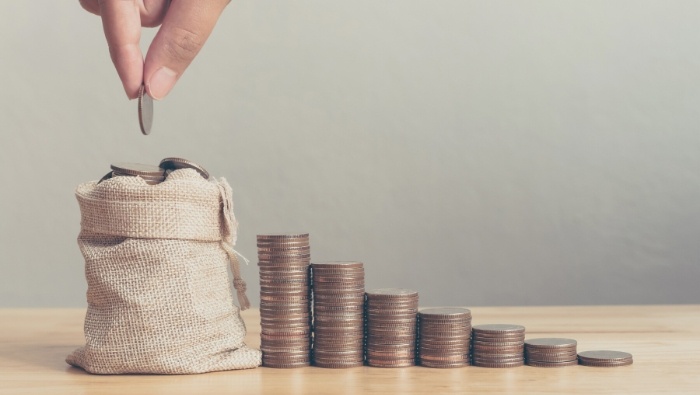How Saving $2.75 a Day Can Change Your Life
by Gary Foreman

Small changes in your daily money habits could have a significant impact on your financial future. Consider how saving as little as $2.75 a day can change your life.
In 2016, the presidential election demonstrated how small changes can have a big impact. It’s reported that just a few hundred thousand votes in a couple of swing states would have turned the election and made a significant difference in the country’s direction.
The same is true of your finances. Small changes in your daily habits could have a major impact on your financial future. And, unlike politics, which can change direction quickly, once these habits are in place, the results are all but guaranteed because they’re based on the facts of life and mathematics.
Small Amounts Add Up Over Time
First, here’s a fact of life. People who lend money charge interest. If I loan you $100 for a year, I expect to get more than $100 back. Perhaps it’ll only be a dollar or two. The interest might not seem like much, but it becomes more important because of the mathematics rule.
That rule has to do with the cumulative nature of math. It says that small amounts add up over time. There’s no rocket science involved, but it is profound. The greater the time, the greater the cumulative effect.
Let’s create two examples to prove our point.
Sign Up for Savings
Subscribe to get money-saving content by email that can help you stretch your dollars further.
Twice each week, you'll receive articles and tips that can help you free up and keep more of your hard-earned money, even on the tightest of budgets.
We respect your privacy. Unsubscribe at any time.
The Effect of Small Amounts When Borrowing Money
First, we’ll suppose that you borrowed $1000 on your credit card and continued to carry that exact balance.
We’ll also assume that you pay 15% interest. Since you’re not repaying the principal, you’ll be paying $150 each year in interest. In just ten years, you will have paid $1,500 in interest. If you borrowed the money when you were 30 and didn’t pay it back until you were 60, it would cost you $4,500 over those years. That’s four and a half times what you borrowed. Whew!
Get proactive about tackling your debt.
Get the book How to Conquer Your Debt No Matter How Much You Have and begin the journey to financial freedom today!
The Effect of Small Amounts When Investing Money
Our second example will look at the opposite side of the coin. What happens if you had $1,000 to invest? We’ll assume that you earn a steady 8% per year on the investment. That’s less than the historic average going all the way back to 1928.
That $1,000 investment will be worth $2,159 in ten years and $10,063 in 30 years without any additional money or work on your part. That’s quite a big difference. Instead of working hard to earn and pay $4,500, you can relax and collect $10,063. That’s a swing of nearly $15,000!
Finding the Money To Pay Off Debt and Invest
This raises an obvious question. If you’re $1,000 in debt, where will you get the money to pay off the debt and make a $1,000 investment?
This is where the little change comes in. Saving just $2.75 a day or $19.25 a week will produce $2,000 in two years. That’s an amount that most of us can find in our daily expenses. Think of losing a latte a few days a week or changing your daily lunch habits.
Suppose you’ve already cut everything but the essentials out of your budget. Consider taking a part-time job until you manage to save $2,000. Even a minimum wage job will pay that in a fairly short time.
You may think that your financial station in life is fixed. You’re broke now and always will be. That’s not true. Little things can make a big difference over time.
Reviewed November 2023
About the Author
Gary Foreman is the former owner and editor of The Dollar Stretcher. He's the author of How to Conquer Debt No Matter How Much You Have and has been featured in MSN Money, Yahoo Finance, Fox Business, The Nightly Business Report, US News Money, Credit.com and CreditCards.com.
Sign Up for Savings
Subscribe to get money-saving content by email that can help you stretch your dollars further.
Twice each week, you'll receive articles and tips that can help you free up and keep more of your hard-earned money, even on the tightest of budgets.
We respect your privacy. Unsubscribe at any time.
Wouldn't you like to be a Stretcher too?
Subscribe to get our money-saving content twice per week by email and start living better for less.
We respect your privacy. Unsubscribe at any time.
Popular Articles
- 7 Habits of Highly Frugal People
- 5 Simple Budget Cuts That Can Save $200 a Month
- How to Track Down Unclaimed Funds Owed You
- 32 Ways to Save Money on Your Utility Bills
- Do You Need Credit Life Insurance When Buying a New Car?
- How to Maximize Profits When Selling Online
- Staying Motivated to Continue Digging Yourself Out of Debt
On After50Finances.com
- 9 Things You Need to Do Before You Retire
- You Didn’t Save Enough for Retirement and You’re 55+
- When Empty Nesters Reorganize and Declutter Their Home
- Reinventing Your Career in Your 50s or 60s
- What Mature Homeowners Should Know about Reverse Mortgages
- 2 Reasons to Collect Social Security Benefits As Soon As Possible

